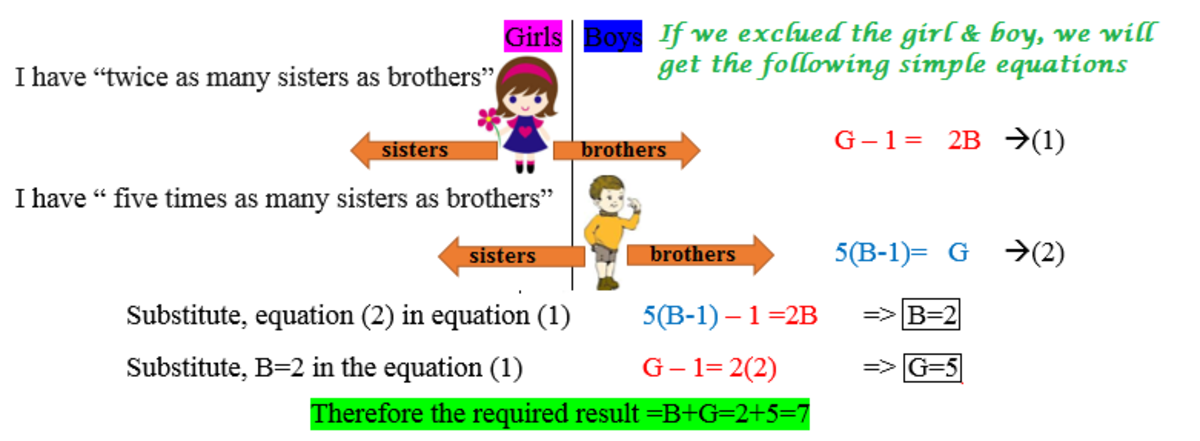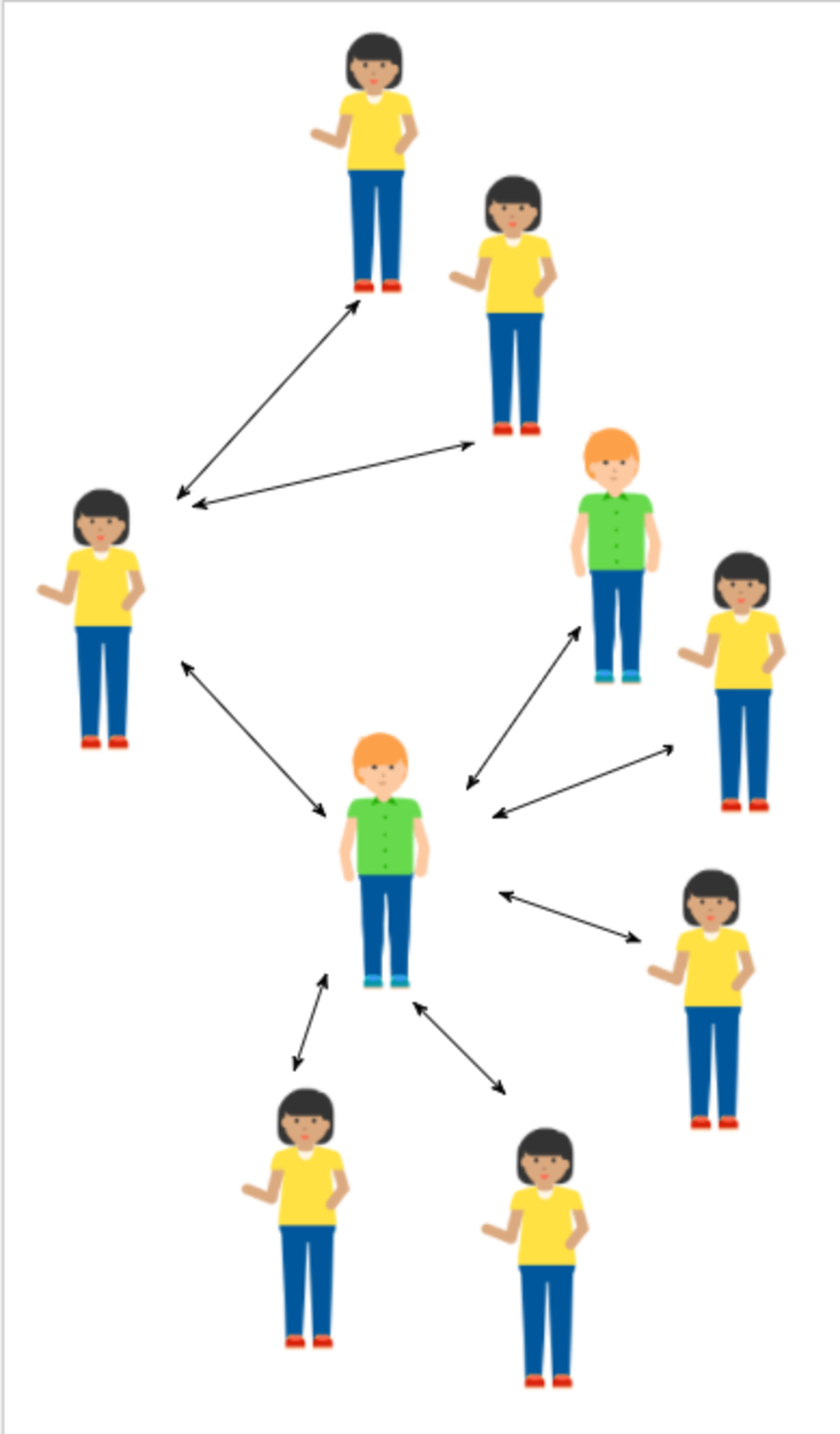97 of 100: The Brothers Are Outnumbered
A girl has twice as many sisters as brothers. Each of her brothers has five times as many sisters as brothers. All the children have the same parents.
Assuming there is at least one brother, how many children are in the family?
Can you think of more than one way to solve it?
The answer is 7.
This section requires Javascript.
You are seeing this because something didn't load right. We suggest you, (a) try
refreshing the page, (b) enabling javascript if it is disabled on your browser and,
finally, (c)
loading the
non-javascript version of this page
. We're sorry about the hassle.
13 solutions
That is an excellent solution! Algebra is a very neat way of solving such questions.
This is exactly how I did it.
This is wrong, the parents are part of the family.
Log in to reply
No, the question specifically states to find the number of children in the family.
Simple trial and error is fastest: From the first clause, there's at least 1 girl, so the minimum possible solution to the second clause is that a boy has 5 sisters and 1 brother. That also turns out to be a solution to the first clause so we're done.
[In fact, if we interpret "each of her brothers" to be vacuously true if there are no boys in line with the normal logical rules of the quantifier "forall", then 1 girl and 0 boys is also a valid solution. But clearly not what was intended given the other solution.]
Let X be the number of girls. A girl has twice as many sisters as brothers, so the number of boys is 2 X − 1 . A boy has five times as many sisters as brothers, hence the family has 5 ( 2 X − 1 − 1 ) girls. Thus X = 5 ( 2 X − 1 − 1 ) and X = 5 . Thus the number of children is X + 2 X − 1 = 7 .
Let the number of girls be x and the number of boys be y
Each girl has x-1 sisters and y brothers
x-1 =2y
x=2y+1
Each boy has X sisters and y-1 brothers
x=5(y-1)
= 5y-5
2y + 1 = 5y-5
3y=6
Y=2-number of boys
X = 2y+1
= 5 = number of girls
So the number of children in the family = 5+2 =7
Four lines from the bottom you have an error: y is the number of brothers, not sisters. Otherwise the math is correct, so you have the correct total but the incorrect sexes. But it is a good argument for using b for boys or brothers and either g for girls or s for sisters.
Thanks for taking the trouble and pointing out the error. Have edited the same. Apologies
There are five girls and 2 boys:
The girl has four sisters (not including herself) and two brothers. Four is twice as big as two.
The boy has one brother and five sisters. 5 is five times has big as 1.
Therefore, 5 sisters + 2 brothers equals 7 siblings.
Let 'G' be the number of girls and 'B' be the number of boys

For each boy, number of sisters is five times the number of brothers, which means, the number of girls is in multiple of five, say 5n.
Then the number of boys is (5n/5)+1=n+1.
Total number of children=5n+(n+1)= 6n+1.
So, for each girl, the total number of (brothers+sisters) is 6n, which is in the ratio of 2:1 between girls and boys, i.e. 4n sisters and 2n brothers.
But, each girl has (5n-1) sisters,
So, 4n = 5n - 1, which gives n = 1,
Total number of children=6n+1=7.
The number of girls has to be an odd number. This is because in order to have twice as many sisters as brothers (and be a girl) then you need to have an even number of sisters, and you count as a sister, making the number of girls an odd number. If you have twice as many sisters as brothers (and you are a boy) then the number of your sisters has to be divisible by 5. That means that the number of sisters can only be 5,15,25,35.... If you start with the least number that there could be (five) than you know that there would be 2 brothers because each sister has 4 sisters, and 2 is half of that. To each brother they would have (in this case) 1 brother and 5 sisters. That is 5 times as many sisters. If this didn't work, then you would have to try the other possible numbers too.
Case 1: Let the total no. of sisters the girl has be 2x Therefore total no. of brothers=x Thus, total no. of girls=2x+1.................(a) Total no. of children=2x+1+x=3x+1............(b) Case 2: The brother is speaking,hence no. of brothers this boy has=x-1 By question,no. of sisters this boy has=5(x-1)............(c) Therefore equating equations (a) and (c),we get, 5(x-1)=2x+1 x=2 From(b),total no. of children=7
I found my answer by drawing a flowchart of the relationships.

The number of girls is a multiple of 5, and one more than a multiple of 2; thus we look for odd multiples of 5, so that g = 5 , 1 5 , 2 5 , … Only g = 5 is realistic, and we see that it matches b = 2 nicely. There is no need to do any further work, unless one is not concerned with realism.
G G G G G - Five (Girls)
B B --------- Two (Boys)
Seven Children.
Each "G" has 4 sisters and 2 brothers satisfying the twice as many sisters as brothers requirement. Each "B" has 5 sisters and 1 brother satisfying the five times as many sisters as brothers requirement.
(PERSONAL NOTE:) I grew up in a family with multiple children:
I had twice as many sisters as brothers.
Each of my sisters had the same number of sisters as brothers.
What is a solution to the number of girls and boys in my family?
There are 3 boys and 4 girls in your family
Since this describes my family exactly, I didn't need to do any formulas. I have 4 sisters and 2 brothers, and each of my brothers has 5 sisters and 1 brother.
Let, g be the number of girls in the family and b be the number of boys.
In case-1, one girl has twice as many sisters as brothers. (Of course, she herself is not included as a sister!) So, g − 1 = 2 b
In case-2, one boy has five times as many sisters as brothers. (Again, the boy himself is not included as a brother!) Hence, g = 5 ( b − 1 )
Subtracting the first equation from the second, we get 1 = 5 ( b − 1 ) − 2 b ⟹ 1 = 3 b − 5 ⟹ b = 2
So, from the first equation, g = 1 + 2 b = 5
Therefore, the total number of children is, 2 + 5 = 7